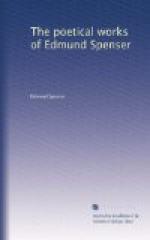At length they all to mery London came,
To mery London, my most kyndly nurse,
That to me gave this lifes first native sourse,
Though from another place I take my name,
130
An house of auncient fame.
There when they came whereas those bricky towres
The which on Themmes brode aged backe doe ryde,
Where now the studious lawyers have their bowers.—
There whylome wont the Templer Knights to byde,
Till they decayd through pride,—
136
Next whereunto there standes a stately place,
Where oft I gayned giftes and goodly grace
Of that great lord which therein wont to dwell,
Whose want too well now feels my freendles case:
140
But ah! here fits not well
Olde woes, but ioyes, to tell,
Against the bridale daye, which is not long:
Sweet Themmes! runne softly, till I end
my song.
[Ver. 137.—A stately place Exeter
House, the residence first of the
Earl of Leicester, and afterwards of Essex. C.]
Yet therein now doth lodge a noble peer,
145
Great Englands glory and the worlds wide wonder,
Whose dreadfull name late through all Spaine did thunder,
And Hercules two pillors standing neere
Did make to quake and feare.
Faire branch of honor, flower of chevalrie!
150
That fillest England with thy triumphs fame,
Ioy have thou of thy noble victorie,
And endlesse happinesse of thine owne name,
That promiseth the same;
That through thy prowesse and victorious armes
155
Thy country may be freed from forraine harmes,
And great Elisaes glorious name may ring
Through al the world, fil’d with thy wide alarmes.
Which some brave Muse may sing
To ages following,
160
Upon the brydale day, which is not long:
Sweet Themmes! runne softly, till I end
my song.
[Ver. 147.—Whose dreadfull name, &c.
The allusion here is to the
expedition against Cadiz, from which Essex returned
in August, 1596. C.]
From those high towers this noble lord issuing,
Like radiant Hesper, when his golden hayre
In th’ocean billowes he hath bathed fayre,
165
Descended to the rivers open vewing,
With a great traine ensuing.
Above the rest were goodly to bee scene
Two gentle Knights of lovely face and feature,
Beseeming well the bower of any queene,
170
With gifts of wit and ornaments of nature
Fit for so goodly stature,
That like the twins of Iove they seem’d in sight,
Which decke the bauldricke of the heavens bright.
They two, forth pacing to the rivers side,
175
Receiv’d those two faire brides, their loves
delight;
Which, at th’appointed tyde,
Each one did make his bryde
Against their brydale day, which is not long:
179
Sweet Themmes! runne softly, till I end
my song.




